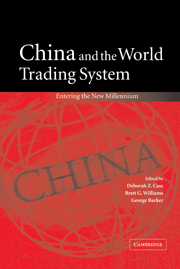Book contents
- Frontmatter
- Contents
- List of figures
- List of tables
- List of contributors
- Preface
- Acknowledgements
- Abbreviations and acronyms
- Introduction: China and the reshaping of the World Trade Organization
- PART I The world trading system
- PART II The accession
- PART III China – the domestic sphere
- PART IV Trade in goods
- PART V Trade in services and competition policy
- PART VI Intellectual property
- 18 Chinese trademark law and the TRIPs Agreement – Confucius meets the WTO
- 19 TRIPs goes east: China's interests and international trade in intellectual property
- 20 The impact of China's WTO membership on the review of the TRIPs Agreement
- PART VII Dispute settlement
- Select bibliography
- Index
18 - Chinese trademark law and the TRIPs Agreement – Confucius meets the WTO
Published online by Cambridge University Press: 28 July 2009
- Frontmatter
- Contents
- List of figures
- List of tables
- List of contributors
- Preface
- Acknowledgements
- Abbreviations and acronyms
- Introduction: China and the reshaping of the World Trade Organization
- PART I The world trading system
- PART II The accession
- PART III China – the domestic sphere
- PART IV Trade in goods
- PART V Trade in services and competition policy
- PART VI Intellectual property
- 18 Chinese trademark law and the TRIPs Agreement – Confucius meets the WTO
- 19 TRIPs goes east: China's interests and international trade in intellectual property
- 20 The impact of China's WTO membership on the review of the TRIPs Agreement
- PART VII Dispute settlement
- Select bibliography
- Index
Summary
Is it necessary for a steel worker to put his name on a steel ingot that he produces in the course of his duty? If not, why should a member of the intelligentsia enjoy the privilege of putting his name on what he produces?
Popular saying in China during the Cultural Revolution (1966–76), cited in W. Alford, To Steal a Book is an Elegant Offense (Stanford, 1995), p. 56.Introduction
One of the most frequently aired concerns about China's accession to the WTO has been that China will not be able to implement the Agreement on Trade-related Aspects of Intellectual Property Rights (TRIPs) so as to ensure that foreign IP right holders will be able to enforce their rights effectively. While those concerns relate to most of the areas of intellectual property covered by the TRIPs Agreement, one of the biggest areas of concern continues to be whether the Chinese government will be able to reduce the pervasive practice of copyright and trademark counterfeiting that exists in China. This chapter deals with the Chinese government's implementation of those provisions of the TRIPs Agreement that relate to trademarks and to the problem of trademark counterfeiting.
Trademark laws, like other intellectual property laws, are relevant to international trade because of the effect that uneven or inadequate protection has on competition. In a market with effective IP protection, manufacturers compete against each other on the basis of quality and price.
- Type
- Chapter
- Information
- China and the World Trading SystemEntering the New Millennium, pp. 321 - 344Publisher: Cambridge University PressPrint publication year: 2003
- 1
- Cited by



